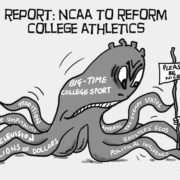“You are not entitled to your opinion. You are entitled to your informed opinion. No one is entitled to be ignorant.” — Harlan Ellison
It would be something of a truism to state that many people these days assume they have an immutable right to voice an opinion on anything and everything. In the U.S., people have free speech, so legally they can voice almost any opinion they want about whatever they want—regardless of whether they have the knowledge necessary to form a reasonable and coherent opinion. Of course, there is no objective reason people should have opinions; they do, and in a free society, they can voice those opinions regardless, even if they don’t make sense.
That said, it’s reasonable to note that just because people have a constitutional right to voice their opinion, it is not necessarily the case that they should always do so.
Why? Because opinions are knotty beasts because they can be based on complete fiction, fact, or almost anything in between. And unfortunately, those voicing an opinion often are not aware of the reliability of its source. Some opinions are based on reading about scientific research.
Still, the validity of the opinion is highly dependent upon whether the person holding it understood the research well enough to form a sound opinion. Other opinions are based on fiction invented to mislead people and manipulate the opinions they express—QAnon is an excellent example of this. And then there are the most difficult ones. These are opinions based on what physicist Richard Feynman called “cargo cult science,” or unfounded, even absurd ideas, such as aliens built the pyramids–packaged in justifications that appear scientific but quickly fall apart when queried.
One of the most significant problems we face in contemporary society is that social media has created a context in which everyone’s opinion counts—even the ones that are wrong and, strangely, even the ones that are harmful.
It is not an intelligent way to organize public discourse because it makes little sense for an erroneous, harmful opinion to carry the same import as a fact-based, benevolent opinion. But how do we know which opinions are reasonable?
Here are several questions you can ask before forming or accepting an opinion:
- Who is asserting this to be true? Do they have the expertise necessary to form the opinion? What did they discover that deems this unequivocally accurate or at least reasonable? What are their sources?
- Is the opinion I’m listening to just a baseless assertion? And if so, why? What is the perpetrator trying to accomplish by spreading this idea?
- Does the opinion pass the most critical test of credulity? Does it satisfy the demands of Occam’s Razor, meaning does it avoid unnecessarily complex and unverifiable explanations to support the opinion?
Asking those questions requires us to consider other issues, such as why people believe any opinion they carry has merit or if all opinions truly matter. The fact is, they don’t. Some opinions, like the idea that there are shape-shifting lizard people walking among us, are stupid and lack any evidential basis to be accepted. They are in no way equal in value to the opinion a physician might arrive at in a diagnosis, one that is based on years of education and extensive reading of peer-reviewed scientific writing.
Of course, doctors get things wrong, which tends to encourage people to believe that their advice must actually be inferior compared to the opinion that reptilian shape-shifters roam the earth, for which there is no evidence at all and, therefore, no evidence overtly refuting the idea.
Perhaps this is all based on something that has existed for some time.
With the help of the internet and 24/7 media, anti-intellectualism now has a much more effective way to enlist ambitious recruits to propagate and even create their baseless conspiracy theories, hence, opinions.
That is why it’s so important to ask, “What is this opinion based on constantly?” Is it based on a study with data generated by scientists that were then peer-reviewed and published in an exceptional journal? Or was it conjured up by some attention-seeker, ready to get attention any way they can, no matter the cost? Did the attention seeker even base their information on a study? Did they even have any data? If so, was the data legit? Was their hypothesis falsifiable?
Despite all this, people will still have their own opinions. And their opinions will be created from their knowledge and their life experience. But we should ask, “Are all of us at an equivalent level of knowledge and experience?” And more so, “Do all of us possess the same types of knowledge and experience?” The answer, of course, is not at all.
In terms of opinions, this is what it means. Despite many wanting their opinion to matter just as much as anyone else’s, the reality is that not all opinions are relevant, and not all opinions are worth voicing. And if not all opinions are relevant, where does your opinion stand?
Do I know enough to construct a useful opinion on jet-plane wing vibration reduction?
Do I know how to run the particle colliders at CERN that would allow me to form opinions on quantum physics?
Perhaps the more significant thing about opinions is that before we rush to express them, perhaps we should ask ourselves, “Do I have enough knowledge and experience that would allow me to state an opinion that has value in this situation?” Or, perhaps the biggest one, “Should I have an opinion at this point, or do I have more learning?”
Fundamentally, the right to voice an opinion comes with a responsibility to ensure that the opinion is reasoned and of value. Social media has created an environment where people feel the only thing that matters is their right to speak without any corresponding responsibility to think about whether or not the opinion one speaks is of any value. And that lack of awareness of one’s responsibility to form reasoned and cogent opinions deeply damages public discourse.
____
Cover graphic courtesy of Eric Barendt, “Freedom of Speech,” Researchers Club (2014).




Ok, so both George and John, due to our interactions, you know me to hold a ‘founded’ viewpoint, (rather than opinion.)
What i find both fascinating, and dismissive, about ‘lay opinion,’ is the total failure of the ‘author(s)’ of any given opinion, to have any sense of value or worth, as to why a non supported opinion, is itself, valid.
As has been suggested, perhaps it is because the author merely seeks representation for his/her own failed understanding?
Moving forward, the question is: ‘Are any opinions valid?’
Most people that would promote time and effort into answering this question, i would suggest, do so having thought long and hard as to IF the question requires attention at all. Those of academic leaning and background, again i would suggest, are capable of dismissing the utterly fallible. Where dismissal requires active input, that input should be promoted, not as a means of dismissing the individual, more as a means of dismissing failed contribution?
If we consider the Scientific Model. When academics seek to have work published, (and in essence publication is in effect, peer reviewed evidence that has been thoroughly tested, based on know knowledge at any given time.) Not only are the positive outcomes of study published but also the negative connotations of output are considered. This is where lay opinion fails. (imv) Lay opinion seeks only to validate the view, and perhaps beliefs of any given author, it is oft spouted with little concern as to the negative impact that any given opinion may have on interaction, merely to promote the author’s own need for validation.
When considered, with the Scientific Model and as a result of consideration for the negative, there are occasion where serendipity intervenes and whole new fields of discussion and study are developed. Perhaps, just perhaps, the same consideration could be applied to lay opinion, even if the outcome, in most instances will result in dismissal?
As always gentlemen, a well considered and extremely competent publication.
Paul Watkins.
Paul,
Thank you for this awesome insight!
Would you mind if I post this to Twitter under the article?
This is too good not to be shared,
George